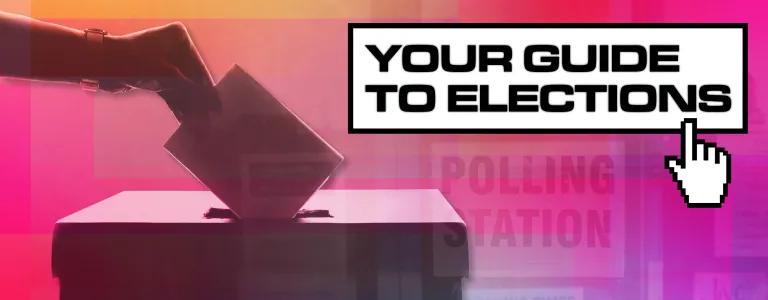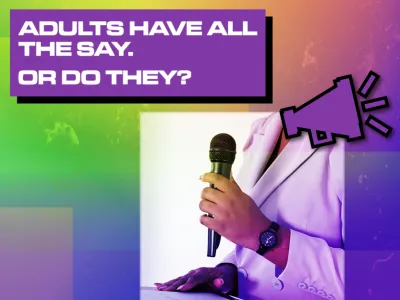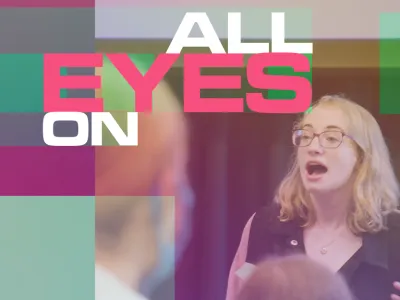
Your Guide To Elections
Include this article in your Skills Builder Journal. It could help you develop... 


Politics. They can be exciting, confusing, overwhelming, and motivating. And influence every part of our life. So how can you make sure you’re up to speed when it comes around to election time and you’re able to vote? Do you know what different elections mean and who you can vote for? Do you know how to vote and why it’s important? If you’re not quite sure, don’t fret! Here’s our handy guide to all things UK elections…
First things first…
The most important thing to know when it comes to elections and voting, is that you have to be 18 to cast a vote in England.
However, if you are 16 or 17, you can still register to vote! That means by the time the first election in your 18th year comes around, you’ll already be on the electoral register (which lists the names and addresses of everyone who’s registered to vote), will receive a polling card, and (hopefully!) be prepped on who you’re going to vote for. And it’s super easy to register, just head on over to gov.uk - it takes about five mins and you’ll need your National Insurance number.

So what’s next?
Once you’re ready to vote, or registered to vote…the next thing to think about is who and what you’re voting for! There are a few different types of elections in England to look out for - the main ones being local council elections and parliamentary elections. These look at things on a small and big scale, we’ll get into the details in a bit.
Probably the most important thing though, no matter what the election type, is who you’re voting for. It’s super important to be sussed up on your selection. So, research the candidates and parties that are running and see how they fit into your personal beliefs and ideals. Do you care about social housing? Climate change? Do you want to lower or raise taxes? How about immigration? By taking a look at manifestos and campaigns, you can get an idea of how representatives feel and what they’d want to do if they got elected - on a local or national level. Because when you register to vote you have to put your current address, it’s likely that in the weeks leading up to elections, you’ll get all sorts of mail from different parties. Make sure to read through them all - or check out the party websites - to find details on what candidates are promising, and to find out more about them as people, and the party as a whole.
Let’s talk election types…
The two main election types in England are local and parliamentary. And they’re different but the same (lol) as in, they both will affect your life, but local elections are…well…local to you. So, it’s the smaller everyday things, and parliamentary elections are more about the country as a whole. Let's delve deeper…
Local Council Elections
This is all about where you live. Things like how often your rubbish is collected, what the roads in your area are like, and the facilities available to you - think leisure centres, libraries, schools etc.
Your local council is in charge of all of that, so the people who work there are super important, and are responsible for things like education, social housing, parks and public spaces, social services, rubbish and recycling, supporting local businesses, and so much more.
Local council elections happen every four years, and the people you’d be voting for - the local councillors - could be involved in all sorts of decisions from setting council tax to dealing with local services, and developing future plans. So you want to know you can trust them, that they’re driven for positive change, and genuinely care about where you live! You can find out who your local councillor is by searching your postcode here.
Parliamentary Elections
This is all about how the country works as a whole - and is also known as a General Election. It still affects you - sometimes even day to day - but it’s more ‘us’ than ‘me’. Think immigration, education, the environment, the NHS, Brexit, defence, transport and more.
Within Parliament, there are two chambers - the House of Commons and the House of Lords. When you vote in a parliamentary election, you’re voting for who you want to sit in the House of Commons.
The person who you’re voting for is a Member of Parliament (MP) who looks after a specific area in the country, known as their constituency. There are 533 constituencies in England!
Parliamentary elections happen every five years, and you’ll be voting for an MP who could help change, pass, or even make laws, help address the issues of people living in your area, ask government ministers questions about current issues, and generally try to do right for their constituency. You can find out who your MP is and what party they are with here, by just putting in your postcode.

It’s voting time…
So, you know what election you’re voting in, and you know who you’re voting for and why. So the next question is…how do you actually vote? Well, you have three options. You can vote in person at a polling station, by post, or by proxy, which means someone else voting on your behalf - if you happen to be on holiday or unable to use either of the other options.
In person: Before the election day comes around, you’ll receive a poll card in the post. This will give you all the information about where to vote, and what time the polling station is open until. You won’t be given a choice on where the polling station is, the one you’re assigned is the one you have to vote at. So make sure you double check where it is and your route to and from. Polling stations can be in all sorts of places, from nearby schools, to village halls, to pubs! All polling stations are open from 7am - 10pm, and as long as you are in the queue by 10pm (yes that means you could get there at 9:59pm!) then you will be allowed to cast your vote. When you enter the polling station, you’ll be asked your name and address so they can check that you’re on the electoral register and cross you off the list to prove that you’ve been! You’ll then be given a ballot paper, which you’ll take to a private booth, make your vote, fold and put in the ballot box. And that’s you done!
By post: This is a good option for people who know they aren't going to be in the country, or able to get to their polling station in time - you might have school or college, and extracurricular activities on the day, that make it impossible to get there. But no fret! You can apply to vote by post before any election, just make sure it’s no later than eleven working days before polling day (but the sooner the better!). Once you’ve applied, a postal vote pack will be sent out to you and all you need to do is follow the instructions, put everything back in the freepost, pre-addressed envelope, and send it back to be counted. Simple!
By proxy: A proxy vote is another way for people to vote when they may not be able to get to the polling station. Pick someone you trust, like a family member or good friend and they will vote, in person, on your behalf. All you need to do is apply to vote by proxy, no later than six working days before polling day (but again, the sooner the better!) and give a reason as to why you need a proxy - this could be that you are overseas, you are away studying, or you can’t go to the polling station because of a specific disability. Then it’s a case of telling your proxy who you want to vote for, and making sure they don’t forget!

What’s next?
Once you’ve voted, it’s a bit of a sit-back-and-wait game. And even then, sometimes you win, sometimes you lose. Your vote is really important either way, as it’s a representation of what you want, you believe in, and what you hope for. So, even if the election doesn’t go the way you want, you can be happy in knowing you had a say.
And there are loads of other ways you can get involved in politics and get excited about making change.
Why don’t you campaign during the election process for the candidate you want to win. Tell your friends and family who you’re voting for and why you believe in them. Speak out on social media about the issues that are important to you and why voting for specific candidates and parties is important.
If your friends aren’t registered, get them excited about it and show them how to do it. You could even make a game of it - see who can get the most people to register.
And, if you want to start making steps into politics yourself, why not check out how you can get involved at local and national levels. Organisations like UK Youth Parliament, for example, encourage young people to use your energy and passion to change the world for the better, and gives opportunities to bring about social change through meaningful representation and campaigning.
So now you’re all clued up…it’s time to take on the world and get voting for what matters to you!






